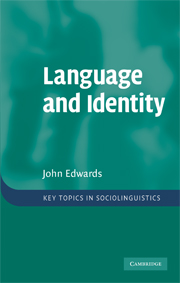Book contents
- Frontmatter
- Contents
- 1 Introduction
- 2 Identity, the individual and the group
- 3 Identifying ourselves
- 4 Language, dialect and identity
- 5 Dialect and identity: beyond standard and nonstandard
- 6 Language, religion and identity
- 7 Language, gender and identity
- 8 Ethnicity and nationalism
- 9 Assessments of nationalism
- 10 Language and nationalism
- 11 Language planning and language ecology
- Glossary
- Notes
- References
- Index
- References
7 - Language, gender and identity
Published online by Cambridge University Press: 05 June 2012
- Frontmatter
- Contents
- 1 Introduction
- 2 Identity, the individual and the group
- 3 Identifying ourselves
- 4 Language, dialect and identity
- 5 Dialect and identity: beyond standard and nonstandard
- 6 Language, religion and identity
- 7 Language, gender and identity
- 8 Ethnicity and nationalism
- 9 Assessments of nationalism
- 10 Language and nationalism
- 11 Language planning and language ecology
- Glossary
- Notes
- References
- Index
- References
Summary
INTRODUCTION
In obsolete usage, ‘gender’ could refer to types or sorts. ‘Diseases of this gender are for the most part incurable,’ wrote a seventeenth-century physician. As a verb, it once indicated copulation: ‘elephants never gender but in private, out of sight’, said Ambroise Paré in his Chirurgie (1564). A little later we find the related sense of the getting of offspring: William Wilkie thus wrote in his Epigoniad of 1757 that ‘from tigers tigers spring; pards gender pards’. But, from at least the fourteenth century, ‘gender’ was essentially a grammatical term.
Words may refer to males or females, or to things that have become associated with these categories. In English, therefore, we find ‘he’ and ‘she’, ‘actor’ and ‘actress’, as well as some less obvious ascriptions – that designate ships as feminine, for instance. Other languages also have a ‘neuter’ gender (and, in English, ‘it’ is a neuter pronoun). It can be difficult to understand some gender allocations: in German, for instance, ‘knife’ (messer), ‘fork’ (gabel) and ‘spoon’ (löffel) are, respectively, neuter, feminine and masculine. In French, pénis is masculine – but so is vagin. Italian sopranos are masculine, but the sentries are feminine. In both French and Italian, the moon (lune, luna) is feminine, and the sun (sole, soleil) is masculine; in German, however, the moon (mond) is masculine and the sun (sonne) is feminine. Und so weiter. And so on. Et ainsi de suite. E così via.
- Type
- Chapter
- Information
- Language and IdentityAn introduction, pp. 126 - 150Publisher: Cambridge University PressPrint publication year: 2009

